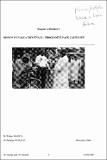| dc.description.abstract | An independent evaluation mission by two external evaluators: Dr Walter MASIGA and Dr
Philippe DURAND carried out evaluation of PACE- Cameroon from 9th to 21st of December
2006.
Although the implementation of PACE Cameroon started in February 2004 much progress
has been achieved to date, as epidemiosurveillance network has spread throughout the whole
country. Because of limited time available priority was given to border areas and divisions
with high livestock populations while wildlife epidemiosurveillance network was established
much later.
The last outbreak of rinderpest was recorded in Cameroon in1983 while vaccination stopped
in 1999. Despite these facts, the dossier for acquiring the status of freedom from disease was
submitted to OIE only in December 2005 and will be considered during the OIE session in
May 2007. Sampling in cattle is in progress and that in wildlife is yet to start due to lack of
equipment and materials. An emergency preparedness plan is in place.
Strategies for the control of priority diseases (FMD, CBPP, ASF) are being developed and in
the case of Avian influenza an emergency preparedness committee is in place.
PACE has given a major boost to the veterinary services of Cameroon. The activities of the
programme throughout the country have resulted in close relationship between farmers and
farmers associations, and both the public and private veterinary services.
The private veterinary sector is growing rapidly especially in high potential areas but the
integration of the private and public services could be promoted by the implementation of
sanitary mandates. It is to be emphasized, however, that PACE is fully integrated in public
veterinary services at all levels.
A special effort has been made to publicize the activities of PACE to all stakeholders using
radio, T.V., bulletins, posters and website.
In accordance with the logframe and AU/IBAR indicator system, the level of implementation
of PACE is above 75% and the ratio funds utilized/funds committed is above 70 % not
withstanding the final statement of accounts. | |
